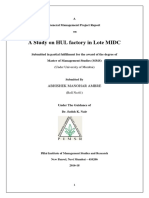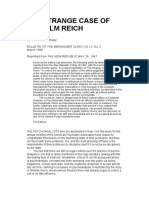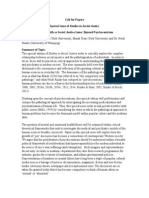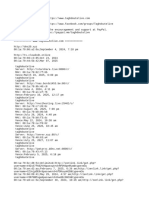0 ratings0% found this document useful (0 votes)
2K viewsJefrrey Sachs
Jefrrey Sachs
Uploaded by
EugeneLangThe document discusses Jeffrey Sachs' transformation from advocating "shock therapy" economic reforms in Russia to leading large-scale international development projects. It argues that Sachs remains committed to neoliberal ideals and uses his relentless work to reinforce his faith in free market solutions, despite the failures he witnessed in Russia. The document suggests Sachs' behavior reflects a "neurotic" need to preserve the fantasy of harmonious capitalism and hide from reality, similar to the general condition of neoliberalism which has grown more complex in responding to accumulating contradictions while maintaining its core principles.
Copyright:
© All Rights Reserved
Available Formats
Download as PDF, TXT or read online from Scribd
Jefrrey Sachs
Jefrrey Sachs
Uploaded by
EugeneLang0 ratings0% found this document useful (0 votes)
2K views9 pagesThe document discusses Jeffrey Sachs' transformation from advocating "shock therapy" economic reforms in Russia to leading large-scale international development projects. It argues that Sachs remains committed to neoliberal ideals and uses his relentless work to reinforce his faith in free market solutions, despite the failures he witnessed in Russia. The document suggests Sachs' behavior reflects a "neurotic" need to preserve the fantasy of harmonious capitalism and hide from reality, similar to the general condition of neoliberalism which has grown more complex in responding to accumulating contradictions while maintaining its core principles.
Copyright
© © All Rights Reserved
Available Formats
PDF, TXT or read online from Scribd
Share this document
Did you find this document useful?
Is this content inappropriate?
The document discusses Jeffrey Sachs' transformation from advocating "shock therapy" economic reforms in Russia to leading large-scale international development projects. It argues that Sachs remains committed to neoliberal ideals and uses his relentless work to reinforce his faith in free market solutions, despite the failures he witnessed in Russia. The document suggests Sachs' behavior reflects a "neurotic" need to preserve the fantasy of harmonious capitalism and hide from reality, similar to the general condition of neoliberalism which has grown more complex in responding to accumulating contradictions while maintaining its core principles.
Copyright:
© All Rights Reserved
Available Formats
Download as PDF, TXT or read online from Scribd
Download as pdf or txt
0 ratings0% found this document useful (0 votes)
2K views9 pagesJefrrey Sachs
Jefrrey Sachs
Uploaded by
EugeneLangThe document discusses Jeffrey Sachs' transformation from advocating "shock therapy" economic reforms in Russia to leading large-scale international development projects. It argues that Sachs remains committed to neoliberal ideals and uses his relentless work to reinforce his faith in free market solutions, despite the failures he witnessed in Russia. The document suggests Sachs' behavior reflects a "neurotic" need to preserve the fantasy of harmonious capitalism and hide from reality, similar to the general condition of neoliberalism which has grown more complex in responding to accumulating contradictions while maintaining its core principles.
Copyright:
© All Rights Reserved
Available Formats
Download as PDF, TXT or read online from Scribd
Download as pdf or txt
You are on page 1of 9
CONCLUSION: THE NEOLIBERAL NEUROSIS
Since the catastrophic failure of shock therapy in Russia, Jefrey Sachs
has taken on an extraordinary number of projects, which have grown
exponentially in their scope and ambition. A profle of Sachs in Vanity
Fair describes how day afer day, without pausing for air, it seems, Sachs
makes one speech afer another meets heads of state, holds press
conferences, attends symposiums, lobbies government ofcials
participates in panel discussions, gives interviews, writes opinion
pieces
1
According to his wife, Sachs only sleeps for four hours a
night, and works 90 per cent of the time during his waking hours.
2
Even while on a family holiday, his wife recalls that Sachs
ofen gave two or three speeches a day in addition to meetings starting
anytime from 7 a.m. till late at night. He then spent most nights writing
technical papers, articles, memos and proposals, while keeping in daily
contact with his colleagues, working with them via phone, fax and
email. All this, while consuming about a book a day on topics ranging
from ecology through tropical diseases.
3
People who have worked or travelled with Sachs are taken aback by
this relentless work-rate. Te journalist who wrote the Vanity Fair
piece found herself wondering what kept him going at this frenzied
pace. Another journalist reported, I took it all in, and later found
myself wondering, Why does he do it?, describing Sachs as engaged
in a desperate Sisyphean efort.
4
A development expert who has col-
laborated with Sachs observed, Te amount of work he puts in is
absolutely mind-blowing. Its complete madness. He is fascinating.
140 JEFFREY SACHS
You try to understand what drives him why suddenly this com-
plete shif from [shock therapy] to poverty reduction? What triggered
that?
5
In an article about the Millennium Villages Project, published
in 2008, a journalist suggested, he almost seems to be on a quest for
some kind of redemption, afer his failure in Russia.
6
Sachs, of course,
rejected this suggestion, insisting that there was no substantive difer-
ence between his shock therapy programmes and his later projects:
For me, that part of my career and this one its all part of the same
person, the same ideas: to help people in need, to help them from the
outside I am the same person I always was.
7
In a sense, Sachs is right. Te same ideas have continued to under-
pin his career from shock therapy to the present. But this continuity
has been defned less by a desire to help people in need than by an
enduring faith in the neoliberal fantasy the profound conviction
that market society is not a utopia to be constructed, but a natural
order already present in the structures of the social world, which will
spontaneously fourish if the right conditions are in place. Tis faith
was evident in Sachss earliest shock therapy experiments, when he
argued that the creation of a market society was not about construct-
ing a world that had never existed, but was based on the more down
to earth strategy of cutting away all other social forms, in order to
reveal what was already there.
8
Te same faith has continued to infuse
his clinical economics, which is predicated not on creating a new
reality, but on removing all pathological elements from a diseased cap-
italism, in order to restore the natural health of the market. Tis faith
also underpins the Millennium Villages Project, which attempts to
raise the capital levels of African villagers to the point at which their
supposedly innate entrepreneurial zeal will spontaneously generate
a functional market system. And the neoliberal fantasy even informs
Sachss populist attack on greedy bankers in the ongoing global crisis,
who he accuses of corrupting the austere benevolence of the natural
capitalist order.
So Sachs is right to say its all part of the same ideas. But hes not
quite right to say its all part of the same person. Over the course of his
career, Jefrey Sachs has morphed from Dr Shock into Mr Aid, even as
the shadow of his past identity has continued to cloud his progressive
and ethical visage. A qualitative change has therefore taken place,
which Sachs himself refuses to acknowledge. Yet this change has not
been defned by the abandonment of neoliberalism, as both disciples
and critics have claimed. Sachs was a neoliberal in the past, and he
continues to be a neoliberal in the present. Te nature of his trans-
formation is therefore located within the parameters of neoliberalism
itself. Ever since the catastrophe of shock therapy in Russia, Sachs has
no longer been just a neoliberal. He has become a neurotic neoliberal.
According to psychoanalytic theory, the frenzied activity of the obses-
sional neurotic is unwittingly devoted to preventing the repetition of
a forgotten past event.
9
In a similar way, Sachss manic schedule, his
determined optimism, and his preposterously ambitious schemes all
serve to modify and reinforce his neoliberal fantasy against the seeth-
ing morass of uncontrollable devaluation, violent dispossession, and
brutal class relations that confronted him in Russia. In contrast to
the swaggering market Bolshevism of the shock therapy era, Sachss
subsequent career has amounted to what Lenin would describe
as the reactionary attempt of a frightened philistine to hide from
stern reality.
10
Tis unfortunate predicament tells us something important about
the nature of neoliberalism. If we consider the history of neoliberal
ideology, we can see that it has always been driven by an anxious desire
to hide the ugly realities of capitalism beneath a fantasy of harmonious
order. Adam Smiths original theory of the invisible hand of the market
was born in the midst of the violent establishment of capitalism in
eighteenth-century Great Britain, providing Smith with a reassuring
vision that concealed the harshness of the world around him.
11
Te
frst great experiment with economic liberalism in the nineteenth and
early twentieth centuries ended in the Great Depression, the Second
World War and the rise of communism.
12
Tese traumatic events drove
the formulation of the neoliberal project by Sachss intellectual godfa-
thers Friedman, Hayek, and Ropke.
13
Once neoliberalism had risen
to hegemonic status driven in part by Sachs himself it became
plagued by a return of the repressed, in the form of fnancial volatility,
spiralling inequalities, and innumerable social conficts. Rather than
revealing the harmony of a market society, neoliberalism had gener-
ated a series of crises that tore through the fabric of the neoliberal
fantasy itself.
In response, neoliberalism has evolved in tandem with Sachss own
trajectory, from the stripped-down fundamentalism of Reaganomics
and the Washington Consensus to the more complex intervention-
ist policies of the Post-Washington Consensus and Tird Way social
CONCLUSION: THE NEOLIBERAL NEUROSIS 141
142 JEFFREY SACHS
democracy. But, as we have seen in Sachss case, these interventions
are aimed not at challenging market society, but at making reality
conform to the neoliberal fantasy. Te principles of free trade and
fscal responsibility remain sacrosanct, and the invisible hand of the
market remains the guiding force of economic activity. Tere is a role
for the state, but only in providing the economic infrastructure and
human capital required for markets to operate efciently. Health and
education should be valued, but only to the extent that they improve
labour productivity. Poverty should be addressed, but this should be
through the voluntary actions of philanthropists and corporations
rather than the mandatory redistribution of wealth. And development
must be ecologically sustainable, but only as a means of ensuring the
sustainability of economic growth and capital accumulation. Te neo-
liberal project has therefore created an ever more elaborate system,
in order to cope with the proliferating contradictions of capitalism in
such a way that the fantasy of a harmonious market society is pre-
served. Tis behaviour resembles that of the the obsessional neurotic,
who builds up a whole system enabling him to postpone the encoun-
ter with the Real ad infnitum.
14
In other words, although Sachss neurosis is unique in its personal
details, it is also symptomatic of a more generalized condition. Tis
condition is shared by other seemingly reformed neoliberals, such
as Joseph Stiglitz. Like Sachs, Stiglitz has made a name for himself
as a critic of the neoliberal project, but has remained wedded to its
fundamentals, serving as Chief Economist of the World Bank from
1997 to 2000, and masterminding its transition from the Washington
Consensus to the Post-Washington Consensus.
15
Other neurotic neo-
liberals include infuential economists such as Dani Rodrik, Nicholas
Stern, and Paul Krugman. Despite his current incarnation as a reborn
Keynesian, Krugman served as an economic advisor in the Reagan
administration, and appeared alongside Sachs and Stiglitz in the
World Bank conference discussed in Chapter 3, which was so central
to the transformation and legitimation of the neoliberal project.
16
Indeed, both Stiglitz and Krugman followed Sachss lead in rushing
to Zuccotti Park during Occupy Wall Street to deliver pseudo-radical
speeches that criticized the free market system they had helped to
create, while anxiously insisting upon the sanctity of a good and pure
capitalism against the supposedly anomalous deviance of the contem-
porary order.
17
Not all neoliberals are neurotic. In fact, we could contrast Sachs
and others like him to unreconstructed market fundamentalists such
as Niall Ferguson and William Easterly, by drawing a distinction
between neurotic and psychotic neoliberals, to the extent that the latter
remain utterly unaware of any dissonance between their fantasy and
the Real.
18
But despite the attacks that Sachs endures from orthodox
neoliberals like Ferguson and Easterly, and despite his own attacks on
them as free market ideologues, it is Sachs and his fellow neurotic neo-
liberals who are the true guardians of the neoliberal project. In their
willingness to engage in ever more invasive forms of planning and
intervention to sustain the coordinates of their fantasy, the neurotic
neoliberals exhibit the peculiar combination of transformability and
resilience that has made the neoliberal project so irrationally persis-
tent in the face of its repeated failures. Te evolution of the neoliberal
project towards increasingly intensive forms of social engineering
should therefore be understood not as the meticulous manipulation of
social reality by a conspiratorial technocratic elite, nor as the rational
unfolding of a comprehensive master-plan, but rather as a series of
increasingly desperate attempts to hold reality itself together, against
the relentless pressure of the Real of Capital.
Paradoxically, however, the obsessive-compulsive rituals of Sachs
and his fellow neurotic neoliberals have only served to intensify the
very contradictions they are struggling to contain. Te neoliberal
project is defned by the drive to liberate capital accumulation from
all external constraints, either by removing all impediments to the
efcient functioning of the price mechanism (as in the case of shock
therapy), or by designing interventions to compensate for market
failure (as in the case of the Post-Washington Consensus). But the Real
of Capital does not correspond to the neoliberal fantasy of a naturally
harmonious market order. No matter what the neurotic neoliberals
do, their actions do not result in the smooth tranquility of general
equilibrium, but only serve to further empower capital itself as an
increasingly volatile and destructive force, which is spiralling beyond
the bounds of social control and driving inexorably towards economic
and ecological collapse. Te predicament of the neurotic neoliberal
thus recalls that of the sorcerers apprentice, who, having summoned
the forces of the underworld, fnds that he is unable to control them,
and that his every attempt to do so only serves to strengthen their
diabolical powers.
19
CONCLUSION: THE NEOLIBERAL NEUROSIS 143
144 JEFFREY SACHS
Poor Jefrey Yet before we start to feel too sorry for him, we
should remember what Sachs is responsible for, and whose side he
is on. Shock therapy caused immense human sufering in Bolivia,
Poland, Mongolia, and elsewhere. In Russia, shock therapy resulted
not only in the longest and deepest recession in modern history, but
also in an unprecedented increase in mortality rates. In other words,
lots of people died. Sachs was utterly unsympathetic at the time, and
scorned calls for allegedly more humane policies,
20
complacently
insisting, If youre going to chop of a cats tail, do it in one stroke.
21
He has never accepted any responsibility for the appalling social con-
sequences of shock therapy, let alone apologized for them. Indeed, the
New York Times recently reported that Sachs now blames the Russian
diet for the increase in mortality rates that followed shock therapy.
22
Te anger that people in the former Soviet Union still feel towards
Sachs was refected in a series of responses on the New York Times
website, including the following:
I grew up cold and hungry in the former Soviet Republic of Armenia
during the shock therapy years of the 90s. My grandfather was one of
the 3 million who died prematurely during those days (incorrect medi-
cation and power outages did him in). I would very much like to tie Mr
Jefrey Sachs to a chair and slowly force-feed him every worthless page
of every idiotic policy paper hes ever written.
23
Not content with washing his hands of the social consequences of
shock therapy, Sachs now lists his actions in Bolivia and Poland as
evidence that [his] own track record has been consistently on the
side of the poor, and claims that he has a record of standing for the
poorest of the poor for decades.
24
Anyone still inclined to sympathize
with Sachs in this regard should consider his response to events in
Bolivia in October 2003, when eighty-one members of the poor
were massacred in cold blood by the government of his shock therapy
sidekick, Gonzalo Goni Sanchez de Lozada, Bolivias president. Te
massacre took place at a demonstration against the governments neo-
liberal policies, and resulted in Goni being forced out of ofce, with
the socialist Evo Morales elected two years later.
25
As a man whose
own track record is consistently on the side of the poor, we would
expect Sachs to condemn his old ally in the strongest terms, and to pay
tribute to the courage of the working class in the face of the murderous
apparatus of the capitalist state. Instead, Sachs celebrated Goni as
one of Latin Americas true heroes
for his role in shock therapy, and
lamented his resignation as a tragic milestone whose meaning extends
far beyond his impoverished country.
26
Sachs criticized Moraless
role in the leadership of the insurrection,
27
complaining that US
interests in Bolivia lie in shambles,
28
and warning that Bolivia would
become a centre of anti-Americanism, violence, and instability.
29
Te
killing of unarmed demonstrators went unmentioned. Instead, Sachs
condemned the deadly rioting in Bolivia,
30
as if the protesters had
massacred themselves.
Looking back across Sachss career, it is no exaggeration to say
that his version of history is a complete inversion of reality, and that
his track record has been consistently on the side of the rich. Goni,
afer all, was not only president of Bolivia at this time, but also one
of the countrys wealthiest capitalists. Sachss earliest contributions to
economics were fxated on returning capital to proftability through
tax cuts, productivity increases, and the reduction of real wages. His
privatization programmes in Eastern Europe and the former Soviet
Union were relentlessly focused on establishing real owners who
cared about the bottom line.
31
Sachs has been a staunch defender of
private property rights against the interests of the poor, both during
his shock therapy era and in his subsequent defence of pharmaceu-
tical companies in his work on health. He maintains close working
relationships with billionaire fnanciers such as George Soros and Ray
Chambers, and has gone to great lengths to collaborate with multina-
tional corporations in the Millennium Villages Project and the Earth
Institute Corporate Circle. In his popular writings, Sachs has consist-
ently emphasized that inequality is not a problem, and even his recent
criticisms of Wall Street are qualifed by his eager insistence that he
is not in the slightest against the accumulation of wealth, even vast
wealth, and his frm assertion that he is not recommending a class
war. Tere is no case for equalizing incomes.
32
To the extent that Sachs is concerned for the poor, it is only a patron-
izing concern for the extremely poor, understood as passive bundles
of human capital to be subjected to his social experiments. In fact,
my experience of the Millennium Villages Project in Uganda suggests
that Sachs is not even concerned with the poor to this limited extent,
as long as his experiments provide him with a stage upon which to
perform his imagined identity as Mr Aid, lost in a messianic fantasy
CONCLUSION: THE NEOLIBERAL NEUROSIS 145
146 JEFFREY SACHS
of salvation. And Sachs is most certainly not on the side of the poor
as the collectively organized and potentially revolutionary subjects of
the working class. Sachss early work is marked by a virulent hatred
of organized labour, and unions and workers are never mentioned as
potential political subjects in his later, more progressive works. In Te
End of Poverty, for example, Sachs provides an extensive list of the
great emancipatory struggles of the modern era, including anti-slav-
ery, anti-colonialism, and the civil rights movement, but excluding the
entire history of working-class struggle, which he replaces with his own
philanthro-capitalist agenda for ending extreme poverty.
33
Indeed, it
could be argued that Sachss concern for the poor is primarily motivated
by a fear of their revolutionary potential. Recall his promotion of his
development model (discussed in Chapter 3) in which he emphasized
what a deal the poor world is ofering the rich world, exclaiming: Te
poorest of the poor are saying We buy into your system. You can keep
your wealth. We dont call for revolution. We just want a little help
to stay alive.
34
Given his consistent defence of economic inequality and the power
of capital, we need to ask why Sachs has been so successful in trans-
forming his public persona from shock doctor to social democrat.
Sachs is now perceived by many on the lef as a champion of their
cause be it poverty alleviation, environmental sustainability, or cor-
porate governance despite the fact that he has continued to espouse
principles that would once have placed him frmly on the right. He
was allowed to pose as the voice of Occupy Wall Street even as he
continued to praise Friedman and Hayek, while endorsing the sanctity
of market mechanisms and the progressive credentials of corporate
philanthropy. Te attitude of many lefists towards Sachs is typifed by
the following extract from a 2011 blog-post by Doug Henwood, who
was once among Sachss most vocal lef-wing critics:
Over the last 10 years, Sachs has changed He has become more and
more critical of economic orthodoxy, both in the poorer parts of the
world and now increasingly in the US So what are we to make of
this? Some of my friends and colleagues think that Sachs should do
penance for his past before we applaud his current work; others think
that acting as a high-profle critic of orthodoxy is penance in itself.
35
Te parameters of this little debate exclude the fact that Sachs is not
really a critic of economic orthodoxy at all, but a committed member
of the economic and political elite, who has consistently defended
its interests against threats from the lef by adopting pseudo-radical
political discourses and advocating limited social programmes in
order to legitimize market economics and capitalist class relations.
Te ease with which this fact is overlooked suggests a wilful blindness.
Indeed, it could be argued that the neoliberal neurosis is a condition
not only of mainstream economists like Sachs, but also of much of
what used to be the radical lef. Te defeats inficted by Tatcherism
and Reaganomics have been far-reaching and profound, extending
to the loss of faith in an alternative future beyond the parameters of
global capitalism. Much of the lef is now trapped within the neolib-
eral fantasy, to the extent that it cannot imagine what social life would
be like if capital accumulation were no longer the dominant impera-
tive. From such a narrow perspective, Sachss messianic promises to
save Africa, and his populist attacks on greedy bankers, might start
to appear progressive. But the alternative they ofer is just another
version of the same fantasy, in which the capitalist system is fair and
inclusive, and everyone participates equally in a harmonious market
society. Ignoring Sachss shock therapy past, denying the continui-
ties between it and his current agenda, and celebrating this agenda
as radical and progressive must be comforting for those who would
like to forget the right-wing foundations of a system they feel unable
to change, and whose contours now appear to structure their reality.
In other words, the crisis of the lef can be measured by the extent to
which Sachs is allowed to pose as its legitimate representative.
A SPECTRE IS HAUNTING JEFFREY SACHS
Te defeat of communism was central to this closure of politi-
cal horizons. Sachs played a key role in this historic process, yet
he remains gripped by a seemingly irrational fear of a communist
resurgence. He reacted to the anti-globalization movement and
Occupy Wall Street by seeking to shif them away from anti-capital-
ism and towards more reformist agendas, and he justifes his recent
endorsement of social democracy in terms of its proven capacity
to defect the growing mass support for socialism.
36
Furthermore,
Sachss own policy proposals repeatedly take inspiration from anti-
communist strategies in the past, without acknowledging their
CONCLUSION: THE NEOLIBERAL NEUROSIS 147
You might also like
- The Culture of Narcissism American Life in An Age of Diminishing Expectations by Christopher LaschDocument304 pagesThe Culture of Narcissism American Life in An Age of Diminishing Expectations by Christopher Laschlansel347807194% (16)
- Necrospective Around Martin Heidegger by Jean BaudrillardDocument6 pagesNecrospective Around Martin Heidegger by Jean BaudrillardEugeneLang100% (1)
- The Sickness is the System: When Capitalism Fails to Save Us from Pandemics or ItselfFrom EverandThe Sickness is the System: When Capitalism Fails to Save Us from Pandemics or ItselfRating: 3.5 out of 5 stars3.5/5 (2)
- Impudent Lasses by Sheila RowbothamDocument21 pagesImpudent Lasses by Sheila RowbothamEugeneLang100% (1)
- Wetiko The Devastating Psycho-Spiritual DiseaseDocument33 pagesWetiko The Devastating Psycho-Spiritual DiseaseJesus Olmo100% (2)
- Pfaller InterpassivityDocument10 pagesPfaller InterpassivityEugeneLangNo ratings yet
- Laclau and Mouffe - Hegemony and Socialist Strategy. "Hegemony - The Geneology of A Concept."Document13 pagesLaclau and Mouffe - Hegemony and Socialist Strategy. "Hegemony - The Geneology of A Concept."EugeneLangNo ratings yet
- Gillian Rose - The Melancholy Science - The Search For StyleDocument20 pagesGillian Rose - The Melancholy Science - The Search For StyleEugeneLangNo ratings yet
- General Management Project On A Study of HUL FactoryDocument42 pagesGeneral Management Project On A Study of HUL Factoryabhi ambre67% (3)
- C3 Crafting & Executing Strategy 21eDocument62 pagesC3 Crafting & Executing Strategy 21eMuthia Khairani100% (1)
- Anti Berg BlablaDocument21 pagesAnti Berg BlablaOriol López EsteveNo ratings yet
- Semiotexte Anti Oedipus - From Psychoanalysis To SchizopoliticsDocument99 pagesSemiotexte Anti Oedipus - From Psychoanalysis To SchizopoliticsOriol López Esteve100% (1)
- A Review of The End of Poverty by JDS - Clive HamiltonDocument3 pagesA Review of The End of Poverty by JDS - Clive HamiltonmanawatitiNo ratings yet
- Marie Louise Berneri Wilhelm Reich and The Sexual RevolutionDocument9 pagesMarie Louise Berneri Wilhelm Reich and The Sexual RevolutiondefoemollyNo ratings yet
- Baran Marxism and PsychoanalysisDocument68 pagesBaran Marxism and PsychoanalysisZach100% (1)
- Capitalism S Crisis of CareDocument9 pagesCapitalism S Crisis of CareMariana MeirellesNo ratings yet
- Mask Off: Crisis & Struggle in The Pandemic: Originally Published byDocument84 pagesMask Off: Crisis & Struggle in The Pandemic: Originally Published bymalonageNo ratings yet
- Capitalism Critique Core SDI 2011Document60 pagesCapitalism Critique Core SDI 2011Evan JackNo ratings yet
- Marie Louise Berneri Wilhelm Reich and The Sexual Revolution - LTDocument6 pagesMarie Louise Berneri Wilhelm Reich and The Sexual Revolution - LTdefoemollyNo ratings yet
- Chomsky, Anarchy & AnakakaismDocument14 pagesChomsky, Anarchy & AnakakaismVivek BalramNo ratings yet
- SWYNGEDOUNW - Erik - WILSON - There Is No AlternativeDocument15 pagesSWYNGEDOUNW - Erik - WILSON - There Is No Alternativemarcos dominguezNo ratings yet
- Domestic Labor RevisitedDocument14 pagesDomestic Labor RevisitedNitin VarmaNo ratings yet
- Social Revolution and Its Discontent: Why Thermidorian Organizations Come Apart in Modern TimesFrom EverandSocial Revolution and Its Discontent: Why Thermidorian Organizations Come Apart in Modern TimesNo ratings yet
- Esteva Commoning in The New SocietyDocument16 pagesEsteva Commoning in The New SocietyMotin-drNo ratings yet
- (New American Canon) La Berge, Leigh Claire - Shonkwiler, Alison - Reading Capitalist Realism-University of Iowa Press (2014)Document272 pages(New American Canon) La Berge, Leigh Claire - Shonkwiler, Alison - Reading Capitalist Realism-University of Iowa Press (2014)Engin ÜmerNo ratings yet
- SSRN Id3128705Document9 pagesSSRN Id3128705Samuel PepitoNo ratings yet
- Psychoanalytic ReviewDocument21 pagesPsychoanalytic ReviewAsya ÖzparlakNo ratings yet
- Friedrich Nietzsche: Major Works: The Gay Science (1882), Thus Spoke Zarathustra (1883-85), Beyond GoodDocument7 pagesFriedrich Nietzsche: Major Works: The Gay Science (1882), Thus Spoke Zarathustra (1883-85), Beyond GoodBently JohnsonNo ratings yet
- Fabricated New AgeDocument30 pagesFabricated New AgecachouNo ratings yet
- Langlitz:Hartoghson ReviewDocument6 pagesLanglitz:Hartoghson Reviewtimasanz petrementNo ratings yet
- BYRAM CAMPBELL - New Mythology of Racial Equality (1963)Document75 pagesBYRAM CAMPBELL - New Mythology of Racial Equality (1963)Géza HegedűsNo ratings yet
- Sage Publications, LTDDocument23 pagesSage Publications, LTDAbhishek ChatterjeeNo ratings yet
- Samir Amin - The Liberal VirusDocument64 pagesSamir Amin - The Liberal VirusThomas PembertonNo ratings yet
- Anarchism: From Theory To Practice by David GuérinDocument120 pagesAnarchism: From Theory To Practice by David Guérinjeers16No ratings yet
- Perishable - Money - in - A - Threefold - Commonwe. The Economics of German AnarchismDocument25 pagesPerishable - Money - in - A - Threefold - Commonwe. The Economics of German AnarchismLibertarian PersonalistNo ratings yet
- The Truth AboutDocument4 pagesThe Truth AboutFiodor GpeskiNo ratings yet
- Dissertation Michael WalzerDocument4 pagesDissertation Michael WalzerBuyCheapPaperNorthLasVegas100% (1)
- Sociology A Disinvitation by Peter BergeDocument8 pagesSociology A Disinvitation by Peter BergeaqsaabbasbhNo ratings yet
- New Worlds For Old: “We all have our time machines, don't we. Those that take us back are memories...And those that carry us forward, are dreams.”From EverandNew Worlds For Old: “We all have our time machines, don't we. Those that take us back are memories...And those that carry us forward, are dreams.”Rating: 3.5 out of 5 stars3.5/5 (5)
- Veith - 'Hegelian Dialectics and Conspiracy'Document14 pagesVeith - 'Hegelian Dialectics and Conspiracy'Kam Ho M. WongNo ratings yet
- Collected Works. Illustrated: Proposed Roads to Freedom: Socialism, Snarchism and Syndicalism. Еhe Problems of Philosophy. Mysticism and Logic and Other EssaysFrom EverandCollected Works. Illustrated: Proposed Roads to Freedom: Socialism, Snarchism and Syndicalism. Еhe Problems of Philosophy. Mysticism and Logic and Other EssaysNo ratings yet
- The Glass Half-Empty: Debunking the Myth of Progress in the Twenty-First CenturyFrom EverandThe Glass Half-Empty: Debunking the Myth of Progress in the Twenty-First CenturyNo ratings yet
- Post Truth and The Return of FascismDocument7 pagesPost Truth and The Return of FascismlexhoangNo ratings yet
- Dole - Mass Media - IJMES - 2006Document24 pagesDole - Mass Media - IJMES - 2006kebap3433No ratings yet
- Brady - The Strange Case of Wilhelm Reich PDFDocument7 pagesBrady - The Strange Case of Wilhelm Reich PDFfbnfrancisco100% (1)
- We Are All Very AnxiousDocument8 pagesWe Are All Very AnxiousOinkz OinkzzNo ratings yet
- Empty Self - CushmanDocument13 pagesEmpty Self - Cushmanreinierruimhuis100% (1)
- The Quest for Community: A Study in the Ethics of Order and FreedomFrom EverandThe Quest for Community: A Study in the Ethics of Order and FreedomRating: 4.5 out of 5 stars4.5/5 (8)
- Daniel Guerin Anarchism From Theory To PracticeDocument94 pagesDaniel Guerin Anarchism From Theory To PracticeRăzvan Constantin DincăNo ratings yet
- From Cybernetics To Littleton - Techniques of Mind Control PDFDocument10 pagesFrom Cybernetics To Littleton - Techniques of Mind Control PDFTim Njagi100% (1)
- Reed - The Micro Politics of CapitalDocument224 pagesReed - The Micro Politics of CapitalAdam Aboulafia100% (1)
- The Micro Politics of Capital Marx and The Prehistory of The PresentDocument224 pagesThe Micro Politics of Capital Marx and The Prehistory of The PresentMarcelo ValdenegroNo ratings yet
- New Age Series Part ThreeDocument11 pagesNew Age Series Part ThreeobserverxiaoheNo ratings yet
- Cyril Smith - Marx at The MillenniumDocument28 pagesCyril Smith - Marx at The MillenniumMarijan KraljevićNo ratings yet
- Willing Slaves of Capital - Bare Life and MoneyDocument5 pagesWilling Slaves of Capital - Bare Life and MoneyEugeneLangNo ratings yet
- Social Justice Mental Health CFPDocument5 pagesSocial Justice Mental Health CFPEugeneLangNo ratings yet
- CFP - Approaching The LiminalDocument2 pagesCFP - Approaching The LiminalEugeneLangNo ratings yet
- Jacques Ranciere - Hatred of The Poor - Politics or The Lost ShepherdDocument17 pagesJacques Ranciere - Hatred of The Poor - Politics or The Lost ShepherdEugeneLangNo ratings yet
- HUMANISM AND SOLIDARITY by Todd MayDocument11 pagesHUMANISM AND SOLIDARITY by Todd MayEugeneLangNo ratings yet
- Western Normativity CFPDocument2 pagesWestern Normativity CFPEugeneLangNo ratings yet
- A Post-Neoliberal Ecopolitics (Philosophy Today) by Thomas NailDocument12 pagesA Post-Neoliberal Ecopolitics (Philosophy Today) by Thomas NailEugeneLangNo ratings yet
- Cathodic Protection & AC/DC Interference Mitigation Installation, Inspection & Test Plan (ITP)Document10 pagesCathodic Protection & AC/DC Interference Mitigation Installation, Inspection & Test Plan (ITP)wei gao100% (1)
- Advantages of BusbarDocument7 pagesAdvantages of BusbarVíctor CasadoNo ratings yet
- PY32F002B Reference Manual v0.5-4Document62 pagesPY32F002B Reference Manual v0.5-4palurdo2No ratings yet
- Cooling Water Treatment and Analysing: Operating InstructionDocument7 pagesCooling Water Treatment and Analysing: Operating Instructionamin32No ratings yet
- 666297A ERA ChartDocument2 pages666297A ERA Chartyiannis-skliris-2585No ratings yet
- Array and FunctionDocument32 pagesArray and Functionmuqigewa84No ratings yet
- Polymeric Drug Delivery System Based On PluronicsDocument24 pagesPolymeric Drug Delivery System Based On PluronicsNatalia SantosNo ratings yet
- Course Code 6553 Course Name Text Book Development-II Semester Autumn 2020 Assignment No 2 Describe The Significance of Training in Teaching. Also Discuss The Different Types of Trainings?Document16 pagesCourse Code 6553 Course Name Text Book Development-II Semester Autumn 2020 Assignment No 2 Describe The Significance of Training in Teaching. Also Discuss The Different Types of Trainings?Muhammad kashifNo ratings yet
- CC - Profile SheetDocument2 pagesCC - Profile Sheetkhaled waleedNo ratings yet
- Introduction and Basic Concepts: Heat and Mass Transfer: Fundamentals & ApplicationsDocument46 pagesIntroduction and Basic Concepts: Heat and Mass Transfer: Fundamentals & ApplicationsMatthew ShieldsNo ratings yet
- Ilide - Info Vitsol Memorial For Appellant PRDocument30 pagesIlide - Info Vitsol Memorial For Appellant PRAnjana AjayNo ratings yet
- Sociolinguistic Variation in Urban Linguistic LandscapesDocument189 pagesSociolinguistic Variation in Urban Linguistic Landscapesy22pmrpj57No ratings yet
- 149 Diya Rabari WTR WordDocument114 pages149 Diya Rabari WTR Wordswati_mehta2210No ratings yet
- LJ Zalia - TutorialDocument104 pagesLJ Zalia - TutorialFuji Rachfiani PutriNo ratings yet
- JP Morgan Chase A Tale of Two MergersDocument7 pagesJP Morgan Chase A Tale of Two MergersmascalzoneNo ratings yet
- William Stallings Computer Organization and Architecture 7 Edition System BusesDocument40 pagesWilliam Stallings Computer Organization and Architecture 7 Edition System BusesUsman khanNo ratings yet
- Oil Record Book Part IDocument21 pagesOil Record Book Part ISamarth Aryan Singh100% (3)
- STB M3U Xtream - 22-05-2024Document13 pagesSTB M3U Xtream - 22-05-2024CalogeroNo ratings yet
- 2 Approximations and Rounding ErrorsDocument20 pages2 Approximations and Rounding Errorsİsmail ErenNo ratings yet
- Holistic ExamDocument1 pageHolistic ExamDejene TsegayeNo ratings yet
- Eapp Q4 SLK 1 A Concept PaperDocument17 pagesEapp Q4 SLK 1 A Concept Paperlovely dacanayNo ratings yet
- 035 Procedure For Material Traceability and Markingpdf PDF FreeDocument16 pages035 Procedure For Material Traceability and Markingpdf PDF FreeabbasNo ratings yet
- DS Technicolor CGA0Document4 pagesDS Technicolor CGA0DavidCRZNo ratings yet
- Army Public Schools Application For Teaching StaffDocument3 pagesArmy Public Schools Application For Teaching StaffSunil SharmaNo ratings yet
- SoP Guide by MITDocument6 pagesSoP Guide by MITNibasB.ApuNo ratings yet
- Analysis of The Financial Performance of A Banking Sector - BOIDocument2 pagesAnalysis of The Financial Performance of A Banking Sector - BOIchandiaNo ratings yet
- Osha HirarcDocument62 pagesOsha HirarcanesseNo ratings yet
- PciDocument11 pagesPciAshwathyNo ratings yet





































































































